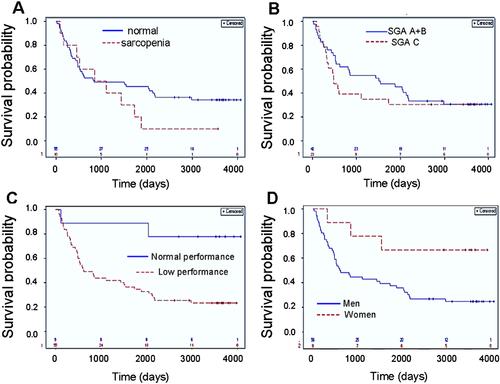Oesophageal cancer is associated with dysphagia and reduced caloric intake. Body composition and prevalence of sarcopenia in patients with oesophageal cancer before and after surgery are not well known. The aims were to (i) describe body composition and sarcopenia, physical performance, and quality of life (QoL) in a cohort of patients with oesophageal cancer before surgery with curative intent; (ii) investigate alterations in body composition as a consequence of the surgery at 1 and 3 months post-operatively; and (iii) investigate if pre-operative measures are correlated to morbidity, length of stay, QoL, or mortality.
An observational study was performed in 76 consecutive patients with oesophageal cancer planned for open surgery with curative intent. Data were collected from the patient history database. QoL data were derived from the European Organization for Research and Treatment of Cancer QLQ-OES18 questionnaire. Pre-operatively, the patients displayed normal body mass index despite that almost 20% were sarcopenic, 86% had a lowered physical performance level, and 37% of the patients were severely malnourished. All body composition variables except fat mass declined up to 3 months after surgery. No pre-operative biometric measure or QoL item correlated with risk for complications. High physical performance, female sex, and high global QoL score positively predicted overall survival.
Severe malnourishment was common in patients judged suitable for surgery in spite of normal body mass index. Neither pre-operative malnutrition nor sarcopenia was independent risk factor for morbidity or overall mortality. Oesophageal surgery causes long-lasting catabolic effects, highlighting the importance of optimal peri-operative and post-operative nutrition.


